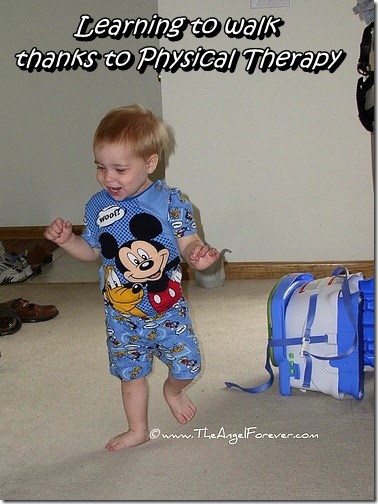When you finally decide to start a family there are a lot of items that you never think about. In your mind, you just dream that your child will be born healthy, hit developmental milestones according to the parenting books, and that everything will be smooth sailing. Then things may begin to happen. Perhaps your child does not talk, or is not playing quite like the other kids in a social setting.
It happens and everyone needs to know that they are not alone. As a parent, looking for resources to check on your child is the first step. I have seen the wonders of Early Intervention. We have had OT, PT, SLP, and beyond between the two boys in their early years.

While it may have been hard to start the process, it was well worth it and I want others to know these programs exist for you and your children. On a past project, I shared some resources and wanted to pass them along here.
______________________________________________________________________
Being a parent can often make you feel alone and unsure of how to handle certain situations. Some days your mind can be filled with questions that are nagging at you like:
- What do you do if your toddler isn’t walking, talking, or feeding themselves?
- How do you know IF you should be concerned ?
- Our doctor says everything is fine, but is it really?
- Do I talk to my friends about this, or keep it to myself?
These are just some of the questions that may be going through the mind of a new or seasoned parent of a toddler. Remember, we all question how our children are developing. It is part of being a parent and perfectly normal to have some concerns.
Thankfully, you do not have to be alone in this journey. You are the best advocate for your child and know when something does not seem quite right. Thanks to New York State Early Intervention Services, you have another ally that is out there for you and your child.
What is Early Intervention (EI)?
EI is a state wide program that provides a broad array of services to eligible infants and toddlers (ages 0-3 years) with disabilities and their families. When you contact EI, you will be assigned a Service Coordinator that will help you to learn more about the EI program and determine your child’s level of services. According to the NYS Health Department, these services include:
- family education and counseling, home visits, and parent support groups
- special instruction
- speech pathology and audiology
- occupational therapy
- physical therapy
- psychological services
- service coordination
- nursing services
- nutrition services
- social work services
- vision services
- assistive technology devices and services
As a first time mother, I watched as my oldest son turned one and was not walking. At 18 months, I was alarmed that my son still could not let go and walk on his own. Each time I questioned this, I was told that some kids walk, others talk. I was naïve and finally saw the light when the director of my son’s daycare mentioned Early Education as an option when he was 20 months old. She told me that I could call and request an evaluation, so I did. My son qualified for physical therapy services based on his low muscle tone. Just before his second birthday, my son was walking on his own. Thanks to Early Intervention, amazing therapists, and hard work – my son caught up with his peers.
If you think that your child may be behind on some milestones, please call your county’s office for Early Intervention. It does not hurt to let professionals assess your child and determine whether or not they would benefit from services. The more you push now, the better off they will be when they head into kindergarten and beyond.
Some Early Intervention county by county resources for those living in the Capital Region and New York State:
- Albany County – (518) 447-4820
- Rensselaer County - (518) 270-2626
- Saratoga County – (518) 583-2498
- Schenectady County – (518) 386-2815
- Washington County – (518) 746-2400
- A Parent’s Guide to the Early Intervention Program
If you have any words of wisdom, experiences you would like to share, or questions – please feel free to leave some comments below.

Disclosure: Parts of this post were previously published on a project I worked on. The text is mostly the same, but I placed a new introduction to go along with a topic that continues to be important for families.





















